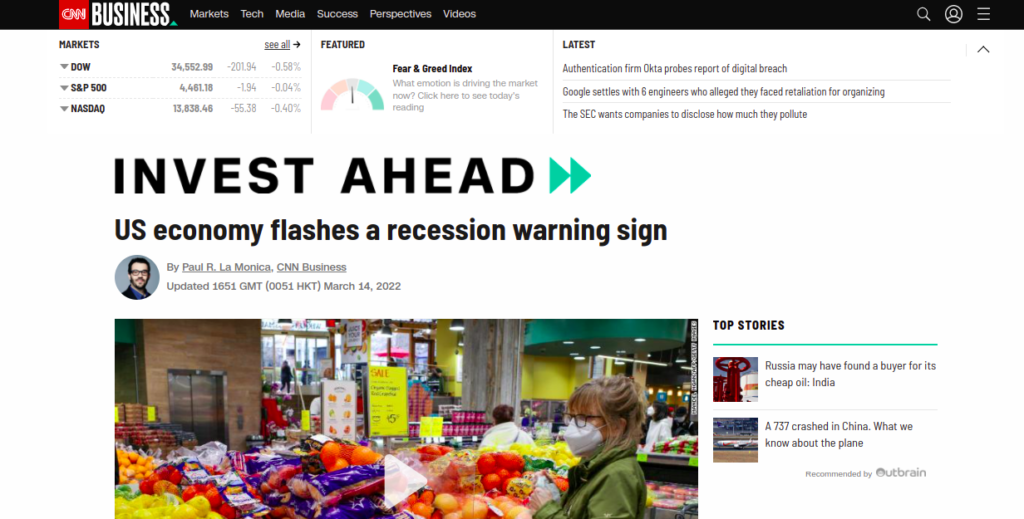As concerns mount regarding the U.S. economy recession warning, experts are taking a hard look at the various factors contributing to this potential downturn. With a fluctuating consumer sentiment index indicating growing unease among American consumers, the outlook for the U.S. economic landscape appears increasingly bleak. Factors such as the prolonged trade war and its impact on the economy have left investors anxious about the possibility of a significant recession. Additionally, the Federal Reserve faces crucial decisions regarding interest rates, as many believe that raising them could aggravate an already strained economic environment. Amidst these challenges, the consequences of current tariff policies are becoming more apparent, prompting discussions about the future vitality of the economy.
Recent warnings surrounding a possible downturn in the U.S. financial landscape have sparked widespread debate among economists and market analysts. The implications of heightened tariffs and their effects on investment and consumer confidence are central to understanding the current economic conditions. Indicators such as the consumer sentiment index reveal troubling signs of decreased optimism, which may herald a shift toward recessionary pressures. Furthermore, as the Federal Reserve grapples with maintaining a delicate balance of interest rates, observers are questioning how these decisions will shape the broader economic future. With the looming specter of a trade war’s repercussions, the stability of the U.S. economy hangs in a precarious position, prompting urgent discussions about potential recovery strategies.
Current U.S. Economy: An Overview
As we navigate through a complex economic landscape in 2025, the U.S. economy faces multiple challenges that threaten its growth trajectory. After facing a series of setbacks, including a recent downturn in the markets attributed to international tariff disputes, analysts are closely monitoring key indicators such as the consumer sentiment index, which has plunged to its lowest levels since November 2022. This decline in consumer confidence reflects a growing unease among households about their financial futures and the overall economic conditions.
The interplay of trade policies, particularly the administration’s aggressive tariff strategy, is central to these concerns. Economists argue that the trade war not only jeopardizes market stability but has wider implications for U.S. economic health. With China, Mexico, and Canada responding to tariffs with levies on American imports, the risk of a recession looms large. This scenario raises important questions about the long-term impact of these policies on domestic industries and consumer spending.
Recession Warning: Risks and Forecasts
Recent analyses, including insights from Harvard’s Kennedy School, highlight a significant recession warning based on five critical factors. A combination of ongoing trade wars, potential stock market crashes, cuts in government spending, and rising fiscal crises suggest that the U.S. economy may be on shaky ground. Jeffrey Frankel, a prominent economist, emphasizes that the current chaotic climate, driven by erratic government actions, is increasing perceptions of risk among investors and consumers alike.
The implications of this risk are stark; if significant job losses occur or consumer spending drastically declines, a recession could be on the horizon much sooner than previously anticipated. Economic forecasts indicate that without stabilizing factors or a paradigm shift in policy direction, the U.S. could face stagnation similar to the 1970s, with high inflation and low growth—a condition termed stagflation. Therefore, understanding the underlying causes of these shifts is crucial for both policymakers and consumers.
Impact of the Trade War on U.S. Economic Outlook
The ongoing trade war has had palpable effects on the U.S. economic outlook, influencing everything from market volatility to consumer confidence. The imposition of tariffs has sparked concerns that American businesses will face rising costs associated with imported materials, which might trickle down to the prices consumers pay for goods. Experts warn that if the trade hostilities continue, it could inflict lasting damage to not only the manufacturing sector but also the overall global market, potentially triggering a recession.
In response, businesses are adopting a cautious approach, many entering a ‘wait and see’ mode that may stall investments and hiring. With consumer sentiment so low, it’s clear that confidence plays a crucial role in economic recovery. Should consumers retreat from spending amidst fears of further tariff impacts, the resulting slowdown could exacerbate existing economic woes, leading to a broader fiscal crisis.
Federal Reserve Interest Rates: Balancing Act
The Federal Reserve is currently facing a pivotal moment as it grapples with decisions around interest rates amidst shifting economic conditions. On one hand, supporting economic growth through rate cuts could invigorate spending and investment, but on the other hand, maintaining higher rates could help stave off inflation, which has been climbing under the pressures of the ongoing trade war. The uncertainty surrounding these policies reflects broader economic challenges, where any misstep could have serious repercussions.
Market analysts have painted a complex picture where the supply shocks caused by tariffs and economic instability force the Fed into a tight corner. Its decisions are further complicated by rising inflation expectations prompted by ongoing financial disruptions, necessitating careful consideration of how best to navigate the dual goals of economic stability and inflation control. As a result, it’s likely that the Federal Reserve will opt for a wait-and-see approach rather than immediate action.
Consumer Sentiment Index: Insights into Economic Health
The University of Michigan’s consumer sentiment index is a crucial barometer for gauging public confidence in the U.S. economy, and its recent decline raises alarm bells for policymakers. Currently sitting at its lowest point since late 2022, this dip suggests that Americans are increasingly apprehensive about their financial prospects. Factors contributing to this sentiment include rising uncertainty in the job market and the impact of tariffs on product prices and availability.
A decrease in consumer confidence typically precedes shifts in spending behavior, which can exacerbate economic downturns. As consumers tighten their purse strings, businesses may be forced to adapt through cost-cutting measures, potentially leading to layoffs and further economic contraction. Therefore, tracking changes in the consumer sentiment index remains critical for understanding the broader economic impact of current policies and projections.
Tariff Policy Consequences for Domestic Markets
The consequences of current U.S. tariff policies are reverberating through domestic markets, bringing both immediate and long-term challenges. As tariffs increase import costs, domestic producers face pressure to raise prices, which can dampen consumer spending and restrict economic growth. A notable shift in trade relations has led to a reevaluation of supply chains, as businesses seek to mitigate risks associated with volatile tariff environments.
Moreover, the tariffs are not only impacting import prices; they also influence international trade dynamics. Countries affected by U.S. tariffs may seek alternative trading partners or retaliate with their own tariffs, complicating U.S. market access abroad. The cumulative effects of these policies could stymie economic recovery efforts and foster an environment of uncertainty that breeds recessionary pressures, underscoring the need for a strategic reassessment of tariff strategies.
Examining the Stock Market’s Role in Economic Trends
Recent trends in the stock market illustrate the interconnectedness of investor sentiment and broader economic stability. Following tariff announcements and subsequent market volatility, investor confidence has significantly wavered, reflecting fears of a recession. Stock market fluctuations can serve as leading indicators, where substantial declines often correlate with decreasing consumer spending and heightened economic anxieties.
The link between consumer sentiment and stock performance cannot be overlooked; as individuals perceive greater risk in their investments, they tend to cut back on spending and investment activities, which in turn stifles economic growth. Monitoring stock market trends therefore provides valuable insight into potential economic downturns, reinforcing the notion that investor sentiment is a crucial component in understanding the pulse of the U.S. economy.
Future Perspectives: Recovery Strategies for the Economy
Looking ahead, developing strategies to pivot the U.S. economy towards recovery will be essential for mitigating the risks of recession. Policymakers and economists must consider the long-term implications of trade agreements and tariff structures to foster a supportive environment for American businesses. Emphasizing diplomacy and negotiations over punitive tariffs could help restore confidence among U.S. consumers and global partners alike.
Moreover, stimulating domestic growth through investment in infrastructure, education, and innovation can serve as a foundation for economic resilience. By addressing structural economic issues and adapting to the challenges posed by international trade dynamics, the U.S. can better position itself for sustained growth, ultimately safeguarding against the potential fallout from current risks, including recession warnings.
The Broader Global Economic Context: U.S. in Perspective
In the context of global economics, the position of the U.S. economy is particularly critical as it navigates international challenges. The economic interdependencies between nations mean that U.S. tariff policies not only affect domestic businesses and consumers but also have far-reaching implications for global trade relations. As other countries respond to U.S. tariffs with protective measures of their own, a retaliative cycle could further constrict global economic growth.
Understanding these dynamics is essential for constructing a comprehensive approach to economic policy that encompasses both domestic stability and international collaboration. By positioning itself as a leader in fostering free and fair trade, the U.S. could work towards smoothing volatile relationships with trading partners and ultimately steering itself towards recovery while mitigating the risk of entering a recession.
Frequently Asked Questions
What are the key indicators of a U.S. economy recession warning?
Key indicators of a U.S. economy recession warning include a declining consumer sentiment index, significant stock market losses, rising unemployment rates, and increased risk perception among investors. The recent trade war, characterized by rising tariffs, has also contributed to these warning signs, raising concerns about potential economic contraction.
How does the trade war impact the U.S. economy and recession concerns?
The trade war impacts the U.S. economy by creating uncertainties that can lead to decreased consumer confidence and spending, contributing to recession concerns. Increased tariffs on American goods can exacerbate job losses and harm specific industries, while also affecting the overall economic outlook due to retaliatory measures from trading partners.
What role do Federal Reserve interest rates play in addressing U.S. economy recession warnings?
Federal Reserve interest rates play a crucial role in addressing U.S. economy recession warnings. The Fed may cut interest rates to stimulate economic growth by making borrowing cheaper, which can encourage investment and consumer spending. However, they must also consider inflation risks created by rising prices, making their policy decisions a balancing act in uncertain economic times.
How does the consumer sentiment index affect perceptions of the U.S. economy and potential recessions?
The consumer sentiment index significantly affects perceptions of the U.S. economy as it reflects individuals’ confidence in economic conditions. A low consumer sentiment index can signal a lack of confidence among consumers, which may lead to reduced spending and ultimately contribute to a recession. As recent data has shown a decline in this index, it raises alarms about potential economic downturns.
What are the potential consequences of tariff policy on the U.S. economy amid recession fears?
Tariff policy can have severe consequences on the U.S. economy amid recession fears, as it tends to increase prices for consumers, reduce trade volumes, and create uncertainty that affects investment decisions. These factors can directly contribute to reduced economic growth, stirring worries about an impending recession if consumers and businesses respond negatively to the heightened costs and unpredictability.
| Key Point | Details |
|---|---|
| Current Economic Climate | Heavy losses in U.S. markets due to tariffs imposed by China, Mexico, and Canada in response to President Trump’s policies. |
| Trade War Impact | Fear of a prolonged trade war leading to recession; consumer sentiment at its lowest since late 2022. |
| Tariff Debate | Most economists oppose tariffs; potential benefits cited only in rare circumstances. |
| Market Correction | Treasury Secretary describes current market selloff as a normal correction, but economists see it as baseless. |
| Recession Indicators | Concerns about trade war, stock market crashes, and government spending cuts indicate a possible recession. |
| Federal Reserve Dilemma | Fed must balance interest rate cuts to support the economy against controlling inflation; likely to keep rates unchanged. |
Summary
The U.S. economy recession warning is increasingly resonating among analysts and investors due to several economic stressors. With tariffs provoking a trade war and consumer confidence waning, the likelihood of a recession looms large. The Federal Reserve faces a critical balancing act, weighing the need for stimulus against inflation control. As uncertainty persists, it’s crucial for stakeholders to monitor these developments closely, as they may have significant implications for the overall health of the economy.


